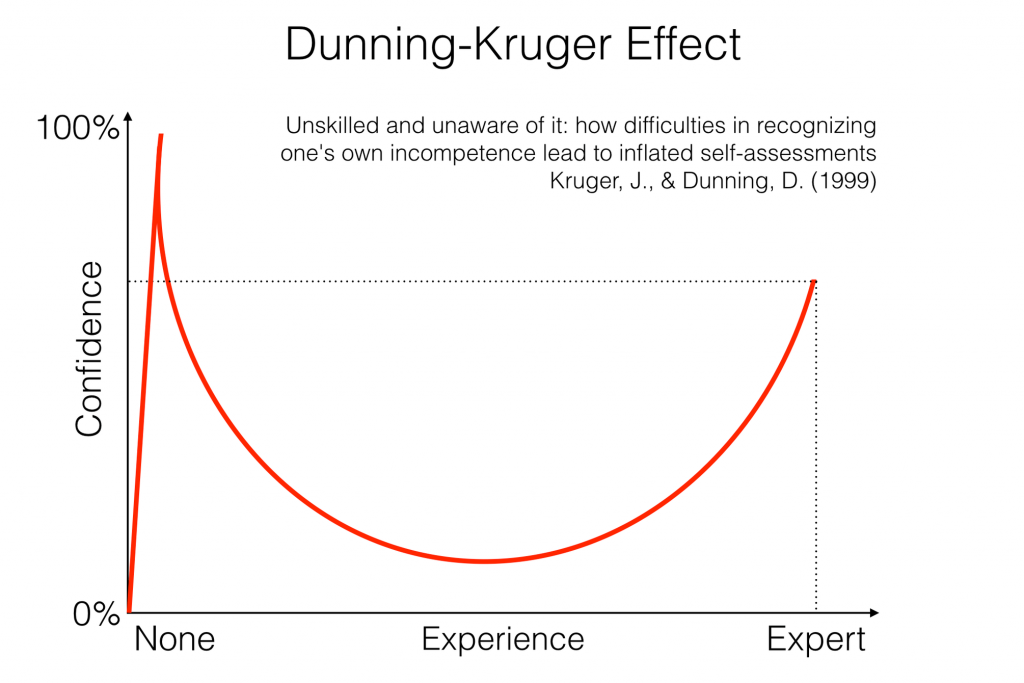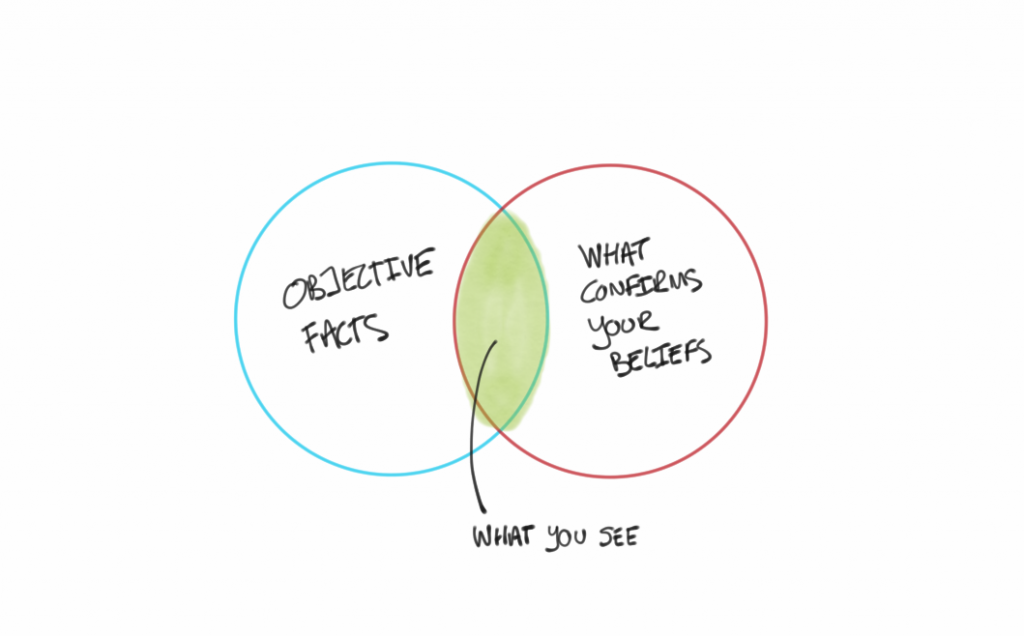
You must have read my previous article: what stops incompetent people from feeling embarassed describing how the Kruger-Dunning effect makes people confident enough to express their opinions on a particular subject even if they are not experts in that field. They actually do it even if they have no idea what they are talking about. In the article I also mentioned that we are all affected by that phenomenon no matter how high our IQ is. Pretty bad news, isn’t it?
Well, thankfully there is a strategy to overcome or rather minimize the Kruger-Dunning effect and it’s worth familiarizing yourself with it in order not to become another unskilled yet confident professional.
#1 Be aware
Step one is to be aware of that effect. You need to understand how your mind works and what kind of biases (there are plenty of them and I encourage you to read about them) can prevent you from being a rational human being. Dunning and Kruger claim that when your experience in some domain increases, the confidence level decreases [1]. Now you are aware of that effect so step one is already done. Good job!

It’s like trying to learn something new. I bet you can somehow relate to that. Let’s take social media marketing for instance. You start off with reading a few articles and you end up doing Udemy or Pluralsight courses. After spending a couple of hours on it you receive a beautiful certificate which makes you feel wise and qualified. After all, it has your name on it! You can probably even hear that proud voice in your head saying:
“Nice! Good job! Now I know pretty much everything about it. I’ll update my resume and start applying for a new position. Companies need someone skilled like me.”
But as soon as you meet an obstacle in your job, you realize that you’re not an expert. You’ll then begin to recognize your lack of knowledge in some areas and you’ll understand that this confidence was misleading. Your brain was just playing a trick on you. So you’ll start to feel insecure and you’ll ask yourself how bad this is.
It may even feel like Impostor syndrome. Then as you gain more knowledge and develop your skills you will finally become a true expert and your confidence level will begin to improve again.
#2 Keep improving yourself
Be humble. Don’t assume that you know everything. I know it can be hard because feeling wise is pleasant. But you need to always raise your standards. The best approach for self-improvement is to dig deeper in order to understand a particular topic better. It allows you to recognize how much there still is to learn. You can try to write an article about the topic you feel confident about or just ask yourself a question:
“Can I explain all that stuff to six year old child?”
If not, probably there is some gap in your knowledge. Read books, blogs, articles, watch vlogs, go to conferences, meet experts and people who are more skilled than you. Anything that will help you continuously improve yourself is a good option.
For instance when I was software developer with 2 years of experience I thought I knew how to code. I thought I was one of the best because… I had read couple of wise books before, you know like “Clean Code” and other classics. The funny fact is that after the next 3 years I had a similar feeling again:
“Oh, so now I really know how to code. How could I have assumed that 3 years ago? That’s a shame.”
If I was still programming now, I would probably feel the same thing again at some point.
#3 Ask for feedback
This one is difficult because of confirmation bias. Most of us are not good at dealing with criticism even if it’s constructive criticism. It’s hard to accept our inaccuracies and misconceptions. But this definitely is an effective strategy to speed up your learning process.

If you’re learning how to present, ask somebody to listen to you and see how you do it. Even a couple of minutes will be enough to notice your biggest mistakes. If you’re designing websites, ask an expert (UI or UX designer) to take a look at your project. If you don’t know anyone like that, use the power of linkedin or facebook groups.
From my perspective I can tell you that feedback really is the best tool to improve yourself. And yes, it still hurts whenever after my workshops I’m given even just one or two negative comments. But I understand that the more time I spend on resolving each problem, the more satisfied my customers become. Believe it or not, the same will apply to you and the areas you want to improve.
Conclusion
The best way to minimize Dunning-Kruger effect is to ask about feedback regularly. No matter what kind of position you hold in your company. If you’re a regular employee or CEO. If you are successful or not. Admit the fact that there is something you don’t know. It’s perfectly fine. You just need to continuously improve yourself.
Every time you feel overconfident remind yourself about that effect and don’t be another unskilled yet confident professional. If you’re a leader you can infrom others about that bias. Maybe during next team meeting they will be less affected and be able to see logical gaps in their thinking.
References
[1] Kruger, J. i Dunning, D. (1999). Unskilled and unaware of it: how difficulties in recognizing one’s own incompetence lead to inflated self-assessments. Journal of personality and social psychology, 77(6), 1121.